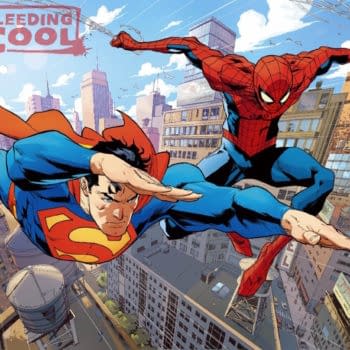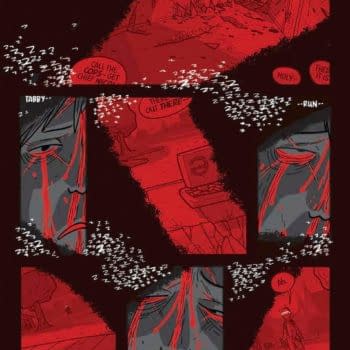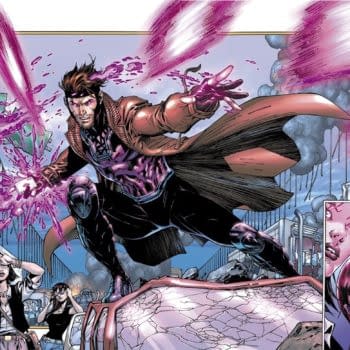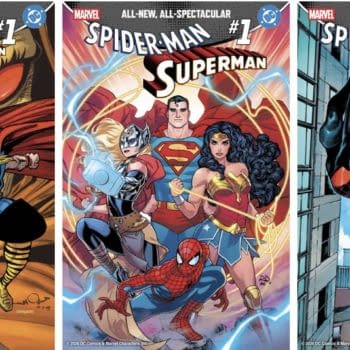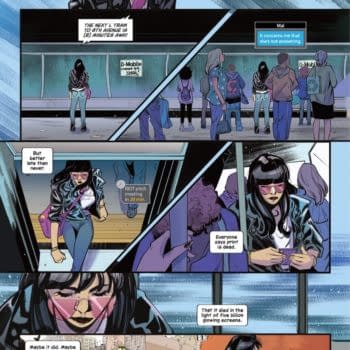Posted in: Comics | Tagged: Bryan J.L. Glass, Comics, entertainment, image comics, jason latour, jim zub, scott snyder, senyc, Simon Roy
SE: NYC '15: The Image Comics: Where Creators Own Genre Panel With Scott Snyder, Jim Zub, Jason Latour, Simon Roy & Bryan J.L. Glass
Special Edition NYC rolled into Sunday afternoon with their final Image Panel focusing on genre comics that are creator-owned. Panelists included Scott Snyder, Bryan J.L. Glass, Jim Zub, Simon Roy, and Jason Latour.
Speaking of "closing out" major series, Bryan JL Glass spoke about Mice Templar with twice the amount of betrayal as Game of Thrones but less sex, if not violence. Jim Zub, speaking of "new number 1s" in comics, talked about Skullkickers #1 covers which caused their sales to "spike up". Skullkickers #100 is coming out, also randomly numbered, though there's a thematic reason for the number.
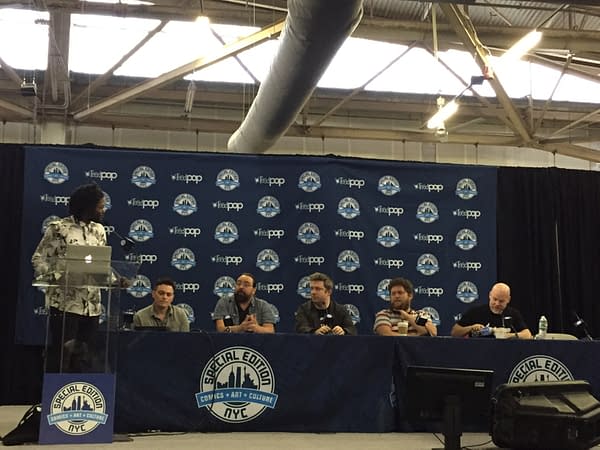
Simon Roy spoke about his shamanism-inspired Dark Age story, Tiger Lung (actually published by Dark Horse) and the unusual creatures and artwork in it. The other panelists chimed in appreciating the book. His Image book is with Prophet and Jan's Atomic Heart and Other Stories.
Speaking about Southern Bastards, Jason Latour said he would've never been allowed to do a sports comic on its own, but sports play the role of religion in the comic. It gives the people "something to believe in" in the story. It's "as much a sports comic as it is a psychological exploration of people who play sports", he said.
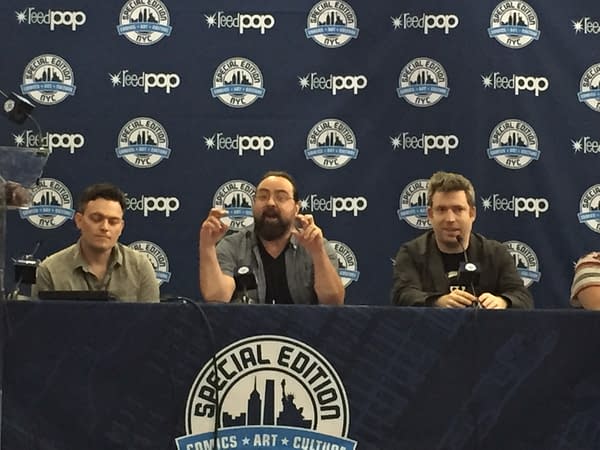
Jim Zub said he always encourages creators to work on the story they believe in, even if it means it's purely a passion project that doesn't yet have an audience. He noted that some of the biggest successes, like BoneJeff Smith's Bone and Robert Kirkman's The Walking Dead were both in that category. He says you see "gravitation" toward Image titles where you can "see the purity of the creative processes coming through".
Asked about including mythology in Wayward, Zub said they "update the Yokai" for the modern world, they ask themselves how those concepts would evolve. It excites him to create "contrast" and "friction" between tradition and modern ideas. Zub says big changes are coming in the comic, and Wayward arc 3 is "past the bike gangs" in terms of a story like Akira's initial phases.
Snyder was asked about constructing Batman arcs vs. creator-owned projects, and he said that all the heroes and villains are "part of that one message, that one thing you're trying to explore" and they are "organically rooted" in the idea you are working on. The "wonderful thing about creator owned", he said, is that you "can do any crazy thing you want" with "no boundaries". Snyder also said that there's a perception that there's a "conflict between superhero and creator owned" and that's just not true for him. He says that honestly, Image pays him more income than Batman right now, but he likes the contrast of it and flexing muscles on both. They are "totally different creative muscles".
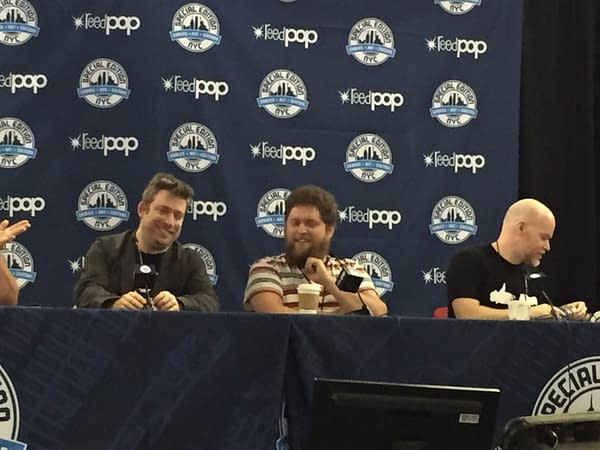
Zub said that doing both types of work makes you a "better storyteller" because you have freedom but don't spend all your time being "indulgent" with creator owned.
Latour said this is a golden age for being able to do creator-owned books. Zub agreed that they all owe Image a big "thank you" for setting up a system where they can make these projects.
Snyder commented that with Wytches, he thought the book would sell very little, but the fact that it's done as well as it has, and the fact that Southern Bastards has done so well is a "seismic shift", dependent on the audience. The fact that readers are supporting these projects and giving creators the "choice" to work on these projects. Snyder said readers are "changing the entire landscape of comics right now" through grassroots support. Zub added that just sharing by word of mouth recommendations between friends to order books, they are "changing lives" and working on a bigger scale than corporations.
When asked about his Image vs. Vertigo books, he said that having so many creative choices on the presentation and content of Image has been really a great experience, but he does plan to work with Vertigo as well in the future.

Simon Roy, who hasn't done any superhero work, feels that Prophet is his "mainstream outlet" and yet it's quite "self-indulgent" drawing tentacle monsters, from his "head" and not from reference. His "creature design" gives him the experience of "designing on the page" which is "very freeing".
Asked if it's "culture shock" for the creators moving between the Big Two and Image, and whether Image is "closing the gap" between the other publishers and the mainstream. Latour actually started at Image, he said, so it's more culture shock for him to work for the Big Two. As much as he's loved Marvel Comics, he said, Image is a kind of "home" and it's nice that their "doors are always open". Scott Snyder said it can be a shock, and the symbiosis is surprising. When he was working on Zero Year and there was a break in creator-owned, since American Vampire was on hiatus, he became "depressed and didn't know why". Not having another outlet was "detrimental to his work in superheroes". He "needs one for the other". He needs to have a world where "he knows the world of the story better than anyone else".
Latour noted a "commonality" among creators who start off just wanting to "tell stories" and then "wind up" in the mainstream. He was raised reading Marvel and DC Comics, but he always made stories "for fun" that were quite different. There was no "guarantee" for him that mainstream work would "work out", so he's been very "lucky" he can tell his stories about whatever "strikes him" at Image.
Asked what books they recommend that might be underrated, Snyder mentioned Lazarus as a book he is very enthused by. Zub said that Invincible is "consistently great". He feels books that go one strongly month after month deserve more support and discussion rather than constant #1s in the press. Simon Roy really felt that Southern Bastards should be read, despite current company on the panel. Latour said that many creators feel like his "classmates", wherein his first book was the same year as the first book by Kirkman, Jason Aaron, Matt Fraction, and more. Latour's "cop out" answer is that he has been "legitimately smitten by Saga". Bryan JL Glass says he's not caught up, but is very keen on Morning Glories. Latour has also recently enjoyed The Fade Out.










